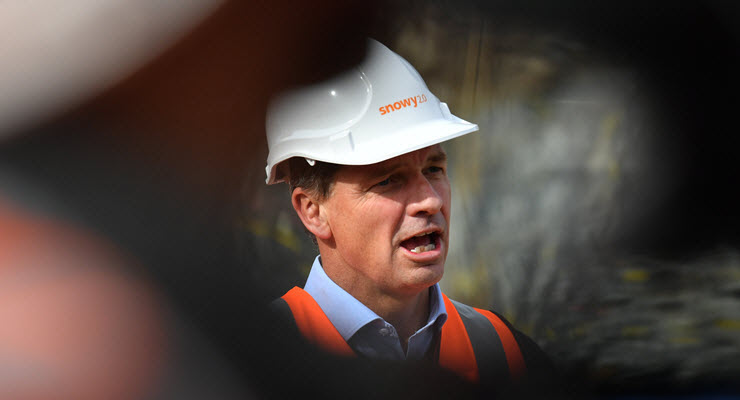
Scandal-plagued energy minister Angus Taylor is on the verge of implementing a plan to force electricity consumers to subsidise unviable coal-fired power stations to continue operating — a plan that is opposed by the bulk of the electricity generation and retailing industry.
Both Reneweconomy and the Financial Review have reported seeing a draft set of recommendations by the Energy Security Board proposing to impose a physical retail reliability obligation (PRRO) on electricity retailers. This would require retailers to purchase capacity for dispatchable power supply — most likely from the owners of fossil fuel power plants. The proposal, along with other electricity market reform recommendations, will go to national cabinet for consideration.
The PRRO and the “capacity market” it is intended to create is ostensibly about ensuring reliability of power supply, despite the fact that it is now gas and coal-fired power that is the least reliable major form of energy, with gas and coal-fired plants forming 40% of all unplanned outages across 2018-19, before Queensland’s Callide C plant exploded this year, shutting it down for a year, after having broken down repeatedly in 2020. Queensland’s Kogan Creek station is the least reliable in the country.
The proposal by the Energy Security Board, which contains former senior coal-fired power company executives, would guarantee a flow of revenue from electricity retailers to fossil fuel generators despite the electricity produced by those generators now being far more expensive than renewable energy — thus guaranteeing they continue in operation despite no longer being commercially viable. It’s the ideal scenario for the climate denialist Morrison government, which is determined to promote coal and gas-fired power and is under pressure from far-right elements within its own ranks to do even more to fund new coal-fired power stations.
The revenue for the PRRO would be sourced from electricity customers, whose electricity bills would increase to cover the cost of the subsidies — thus meaning every electricity consumer on the east coast would be helping to subsidise coal-fired power whether they wanted to or not.
As Giles Parkinson at Reneweconomy showed, there is almost unanimous opposition to the coal-fired power subsidy scheme within the industry: major industry bodies, major gentailer companies like Origin Energy and AGL, renewable power companies, electricity retailers, transmission providers and consumers all either strongly or with qualifications oppose the idea.
The only support for the PRRO came from Coalition donor Trevor St Baker’s Delta Electricity (Vales Point) and Chinese-owned Energy Australia, owner of the antiquated Yallourn power station in Victoria. Both stand to do well out of a flow of free money from electricity customers, imposed by fiat by the federal government, if the east coast state governments agree.








And I thought 239 new cases in Sydney was as crap as things could get today.
These guys are the biggest communists in the country.
It’s why they sold off our vital infrastructure to the CCP, and are not under the bed but in the bed with them
Angus doesn’t care. He’s already achieved so much for his clients, he knows he has a million dollar payday waiting when he leaves office.
It will be a lot more than a million – and it will probably land in a bank on some obscure little Caribbean island. What a guy!!
But the carbon tax! What about the carbon tax which wasn’t a tax but a Credlin lie! The carbon tax that will Roon us all.
Why is this not bigger news? If the media wont get on to it, why isn;t the ALP trumpeting this from the highest point? I suppose as with everything else they don’t dare put any daylight between themselves and the LNP
If you want Labor the next election this is the way the game has to be played, after that we may get our carbon price back.
Labor support the gas component of the government’s plans, and a cadre of them support the coal power plans as well.
Why they do when such support is inconsistent with a 1.5C limit, as well as a 2.0C limit, and most likely a 3.0C limit is a question only the CEFMU can answer.
Follow the money. The ALP receive donations from the fossil fuel industry.
Where is Labor on this? So busy surrendering on tax and property affordability reform, they have no time to challenge the govt? Imagine what Barnaby Joyce would do with this free kick if he were a woke Labor leader. “Not only is this a climate change-denying Government, hopelessly out of touch with will of the people, and the global community. What this shows is who they really work for. They’re captives of big coal. They don’t work for you. So, let’s get this straight – the government who screamed that Labor’s carbon tax would put power bills through the roof, has, ever since, put power bills through the roof. Now, they want YOU to pay their DYING coal donors to keep their antiquated, expensive, polluting plants running? Surely, this is some kind of joke? If you want Australia to keep doing nothing about climate change, if you want a Govt that only works for their fossil fuel donors, if you want your power bills to go through the roof – vote LNP…